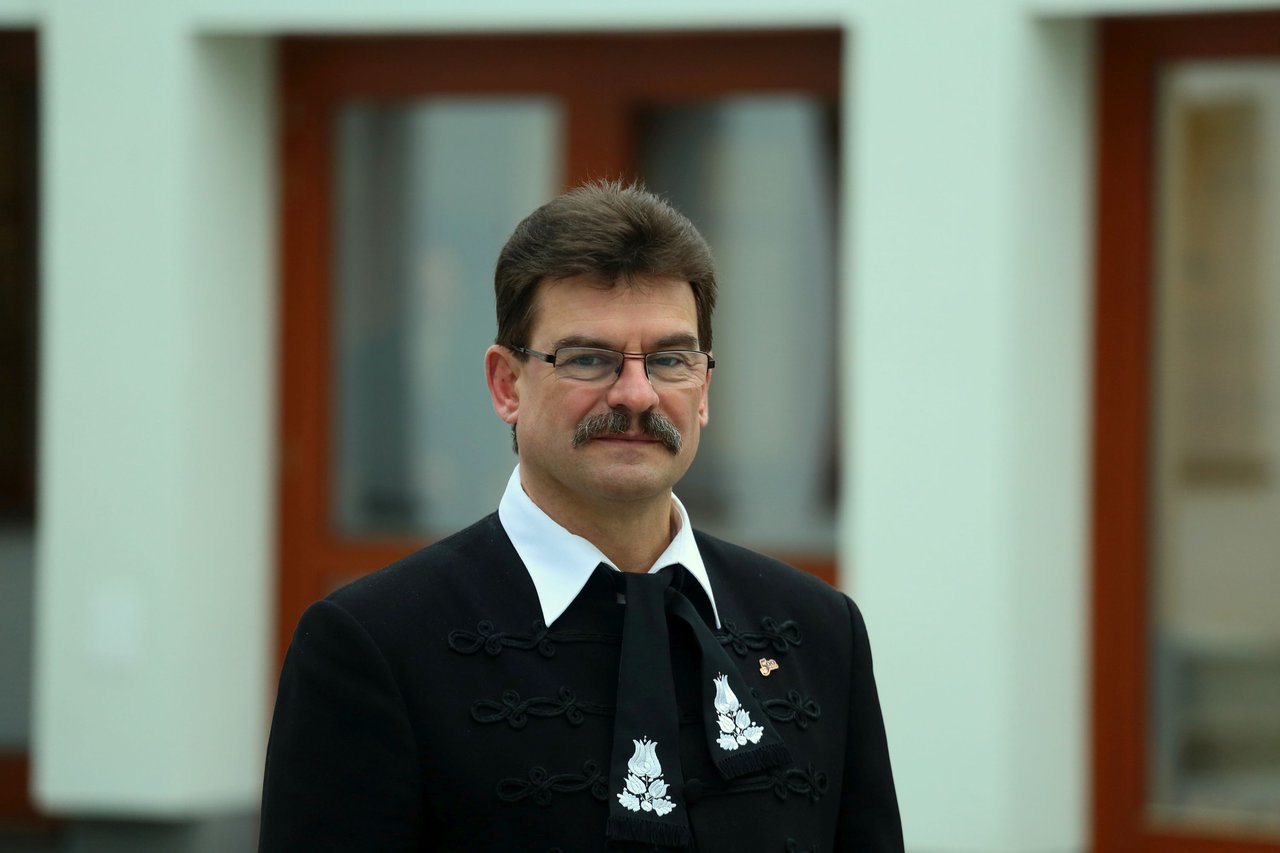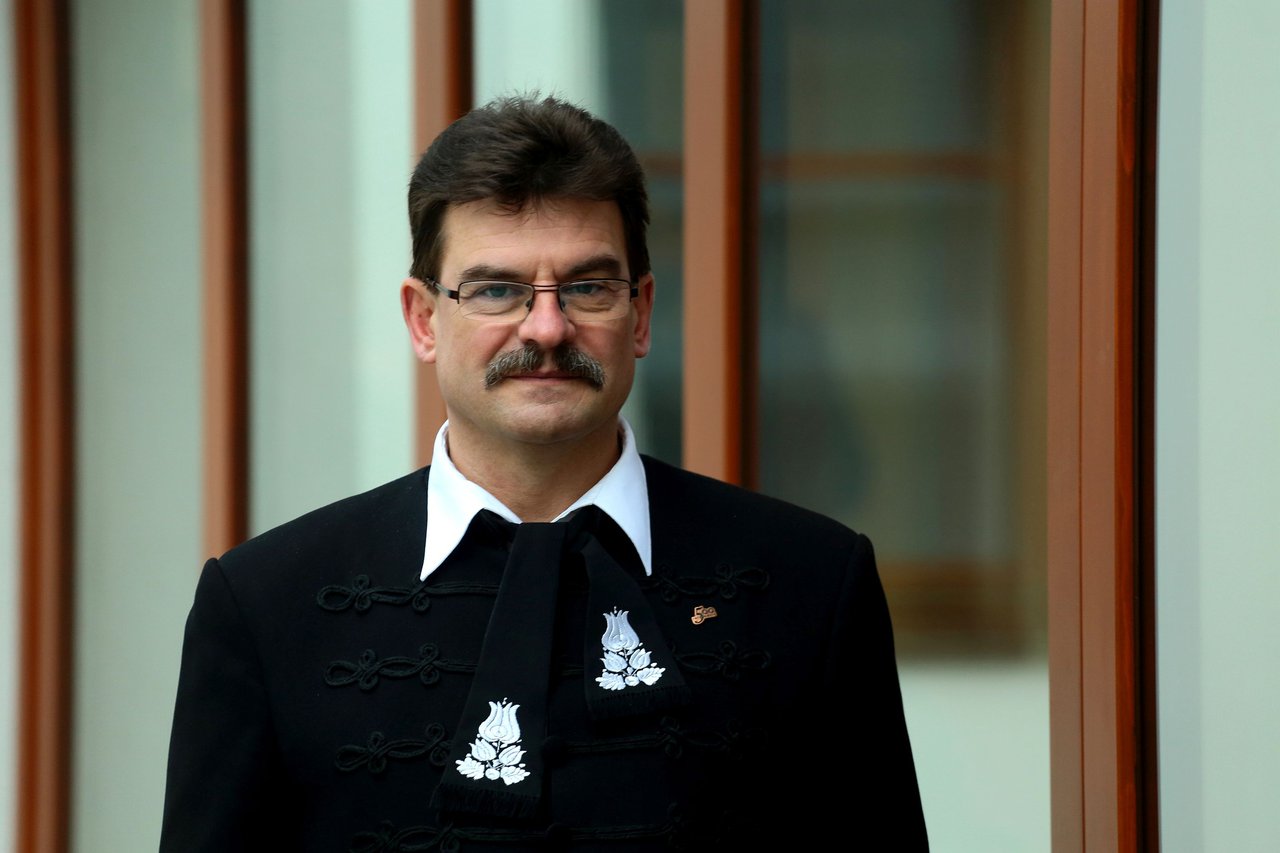
We interviewed László Fazekas, Bishop of the Reformed Christian Church in Slovakia on the issues of ‘Trianon’, national solidarity and cohesion, as well as Hungarian Reformed unity on the occasion of the 100th Anniversary of the Treaty of Trianon.
– According to Balázs Ablonczy, a prominent reformed historian, now that the Treaty of Trianon is a hundred years old, we should not be focusing on invalidating it, but on redefining our national identity. What is your opinion about that, as someone living on the other side of the border?
– In light of the changes in the historical and political situation, it is crucial to articulate what we want. In the first third of the past one hundred years it was an absolutely palpable desire and idea that the situation developing after the First World War would only be temporary, and a new day would eventually rise when the terrible injustice suffered by the Hungarian community would be undone. The First and Second Vienna Awards seemed to support such hopes, but the Paris Peace Treaty that ended the Second World War made it clear that it was never going to happen. Nevertheless – to quote the late historian László Tőkéczki, who was also Lay President of the Danubian Reformed Church District – history is never a done deal.
The wheels of history keep turning. In the current situation we are only able to form subjective opinions, but the redefinition of our national identity is something we absolutely need, regardless of what happens in the territories Hungary lost after WWII. This helps us living in Felvidék (lit. ‘Upland’, the former Hungarian territories of Slovakia) to know who we are, what our values are, where we belong culturally and what we need to do to preserve all this.
Commemoration is Not Closure
At the start of the “Year of National Unity” in Hungary, we sat down to talk to historian Balázs Ablonczy, head of the Hungarian Academy of Sciences’ Lendület (Momentum) Research Group called Trianon 100, about the trauma of Trianon: facts and fallacies, as well as the ever-recurring question of “what if”.
After the Austro-Hungarian Monarchy lost World War I, the Peace Treaty of Trianon in 1920 greatly altered the shape of the Hungarian Reformed Church. The Peace Treaty cut off two-thirds of Hungary's territories. Consequently, a large number of Hungarian Reformed people now live in the surrounding countries. According to the 1910 Census, around 2.5 (2,621,329) million Reformed people lived in the five Hungarian Reformed Church Districts at that time. With the Treaty of Trianon, the number of Reformed people in Hungary dropped by almost 1 million (916,906).
– In your opinion, what was it like for those Hungarians who were torn from the motherland and found themselves in another country, Slovakia?
– I had the chance to talk to some people who were born before the territory of historical Upper Hungary was annexed to Slovakia, and to some others who were children and teenagers when the Treaty of Trianon was drafted. According to them, the Hungarians living in Felvidék experienced a complete shock. The Czech occupation, which already began in 1918, the locals were stunned as they watched the events unfold. They saw that the Czech military arrived as a security – but in reality an occupying – force, and that Czech officials (because there were hardly any Slovak ones) took the place of Hungarians everywhere. Many held out hope that this situation would only be temporary. The occupying power was swift to begin its work, and contrary to what they had promised, their first measures were aimed at weakening and eventually utterly destroying the locals’ sense of belonging to the Hungarian nation. They exercised strong state supervision, forbidding the singing of the Hungarian national anthem, and they inspected educational institutions. Headmasters were both criticized and fined if they did not speak Slovakian well enough, and – later on – if the President’s portrait was not on display. This all sounds familiar to the generations living in Felvidék after WWII or even in the past decades, because the situation remained unchanged for a long time. In this respect there seems to be a tiny ray of hope in the present day.
– Reformed pastors and church leaders also suffered through this trauma. How were they able to support and help their flock?
– The church also felt and experienced the injustices and tried to fight them. The changes took the congregations and pastors by surprise. The ministry in Bratislava, in a letter written as early as 4 September 1919, asked the pastors formerly serving in the Hungarian Reformed Church to sign a pledge of allegiance and start developing a new church organization. Kálmán Révész, who served as bishop at the time, replied that until the peace treaty is ratified, the pastors would not commit themselves to any occupying force. To illustrate the situation that later emerged, let me tell you a story from this time. One day, when Rev. Béla Sörös from Losonc was negotiating with the authorities on our church’s behalf, Lutheran Bishop Sámuel Zoch approached him on the steps of the ministry in Prague: ‘Back in the day when we would go to Budapest to discuss church matters, we would hold the tails of your coat. The only difference today is that now you have to hold ours.’ Sörös’s comeback was succinct: ‘There is another difference: we would not kick backwards.’ For the believers, however, the church and the community of the congregation became a safe haven where they could practise their faith and their sense of belonging more openly, even if they were aware that their former situation and regular circumstances had changed. The church had a significant role in supporting people’s spiritual well-being, but also when it came to the issues of Hungarian education and of caring for those in need, and through all this was able to strengthen the community’s sense of identity.

– The Reformed Christian Church in Slovakia has Trianon to “thank” for its existence. What did and does this mean in terms of the community’s self-identity?
– I feel it was a situation of necessity in which we had to find some underlying opportunities. God’s people cannot stand still; the church must always walk the path of mission and ministry in the world. This is so because the Word of God is something that “happens.” This theological statement defines its existence and dynamics. Listening to the Lord of the church, we must ask for His gifts and opportunities at all times. After the halt caused by the Treaty of Trianon, God gave the then serving congregation leaders the wisdom and clear resolve to organize the church even in that state – being torn away from Hungary. This led to several positive developments, the effects of which can still be felt today. There were awakenings stemming from the activities of the Kiskoszmály Movement, the Bethel Association and the Timothy Movement. Orphanages were set up, where generations of children were raised with a significant religious background – their ministry was a defining force in the life of Felvidék and of the Hungarian Reformed Church for a long time. Both theology and teacher training could begin in Losonc and Komárom, respectively. The spiritual awakening and the constructed heritage of the time is still in service of our church and our nation to this day.
– It was last year that we celebrated, with gratitude in our hearts, the tenth anniversary of the constitution of the so called ‘Common Synod’ and the symbolic establishment of the unity of the Hungarian Reformed Church, which reaches beyond the borders of Hungary. What does this community mean to you personally?
– To me, who has lived a significant portion of my life in an undesirable situation that was forced upon me, in the often painful and discriminatory reality of belonging to another nation,
this community has meant a brand new opportunity for experiencing my faith and my Hungarian identity. It makes me aware that God always provides opportunities for those who trust in Him to be in community with Him and with each other, and to carry all burdens together.
As members of the Hungarian Reformed Church, we can experience the freeing feeling of belonging to one another, which is also in line with the nation-unifying efforts of Hungary’s government. On more than one occasion, we have reiterated with joy that indeed ‘Christ is the future, together we follow Him.’ I truly experience this reality because today’s Europe with its freedom of movement makes it possible and necessary. The majority, Hungary-based portion of our church feels and thinks the same way, while at the same time appreciating our community and relationship with our Slovakian brothers and sisters who also serve in our church. And all this reassures us about God’s preserving love at all times.
Catechism of Church Unification
What is the message of the union to Hungarians and to other national entities? What is the background to and the reasons for the unification? How does the Hungarian Reformed Church realise the European idea in the Carpathian Basin? Questions and answers about the unification in 2009.
– 100 Prayers, a book of prayers that you have published recently, does not keep quiet about the grievances suffered, but it is also self-critical when it comes to our own mistakes, and it advocates for the peaceful co-existence of nations. What is the relationship between Slovakians and Hungarians living in Felvidék?
– 100 Prayers is a successful publication put out by the Presbytery of Zemplén. The fact that both a willingness to show repentance and desire to achieve reconciliation are present in the book is very important. Without these, it would be impossible to settle the past and the present, and it would be difficult to look ahead into the future. Both nations need to possess this attitude, otherwise it is all too easy to pit people against each other. We have seen more than once how those seeking power have taken advantage of the tensions existing between the two nations. Hungarians are offended by the way Slovakian people and leaders approach the past, often distorting and falsifying historical facts, replacing Hungarian names. It would be useful to clear the air and not misappropriate others’ intellectual and cultural heritage. Facts should be taken seriously, certain realities should be accepted, and in some cases regrets and apologies should also be expressed. It would be best to live and let live, giving everyone the freedom to experience belonging to their own nation, culture and language.

Twenty-three pastors of the Church wrote prayers — not “songs of complaint” or “modern-day curse psalms,” but “prayers for the future” and thanksgiving. These were then edited into a pocket-sized, paperback book so they could always be at hand. It was published in 3000 copies, which soon proved to be scarce, and since then another 4500 volumes have left the printing house.
– The Slovakian-speaking Reformed congregations are the minority of a minority, one could say. How does the past hundred years affect the community shared with them?
– Our church, and also the Reformed community within the Carpathian Basin has had Slovakian members for centuries. The first Slovakian hymn book was printed in 1752, and has been re-printed several times since then. It is our experience that we can live our faith side by side, helping each other. For a long time, we kept saying that while we belong to two nations, we follow a single goal, and we represented our church in this spirit of peaceful co-existence in service of the Gospel. In certain historical situations and in the case of certain leaders, however, this endeavour failed. This was most evident after the end of WWII, when our pastors went through years of statelessness and utter vulnerability, and the Slovakian church leaders of the time followed the official state policy of striving for assimilation, withering away the Hungarian minority. Another, more recent example is when in 2011 we joined the Hungarian Reformed Church, and our Slovakian brothers and sisters did not understand why we wished to do so, despite the fact that back in 1994 our Synod, which had a Hungarian majority, adopted a resolution to create two Slovakian-speaking presbyteries, because our Slovakian members had expressed such a desire.
– A hundred years after a world war, we are temporarily separated because of a pandemic. The churches in Felvidék were the first in the Carpathian Basin to be reopened. What has the reopening been like?
– Needless to say, we missed the church setting of our worship services very much. Although people are visibly more cautious, we hope that more and more of them will resume attending church services. It was joyful to see that during the pandemic we were still able to spread the Word of God via the Internet, and our pastors used various ways to bring spiritual nourishment to their flock. And still, experiencing community within a congregation cannot be replaced with anything else, and we can hardly wait for all restrictions to be lifted.
– How do you think we should celebrate our unity, how should we commemorate on the day of national unity?
– As a believer of God, I would like to repent and humble myself before the Lord with a line from Ferenc Kölcsey’s “Hymn” – the national anthem of Hungary –: “But, alas! for our misdeed,
Anger rose within Thy breast,” (trans. Loew, William N.).
I am hopeful that His answer to true repentance will be the outpouring of his grace and a door to the future through our ministry, which aims to advance our preservation and progress as a nation, in the world and here in Felvidék as well.
Translated by Erzsébet Bölcskei